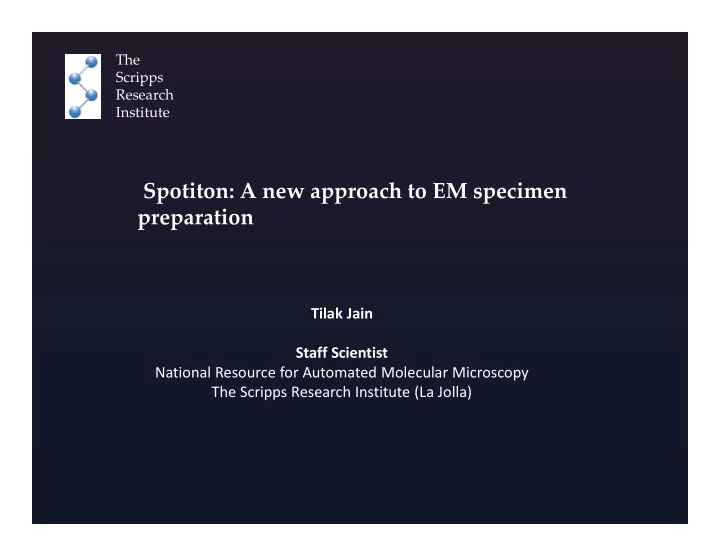

The Scripps Research Institute Spotiton: A new approach to EM specimen preparation Tilak Jain Staff Scientist National Resource for Automated Molecular Microscopy The Scripps Research Institute (La Jolla)
Focus of project Analysis / Discovery Hard-earned proteins 3D reconstruction Samples transfer 2D map of particles Sample vitrification on grids Transfer to EM Images from www
Current methodology (low efficiency) 99.9% 0.1% 3μl 3nl
Current methodology (low throughput) - Buffer conditions - Concentrations - Protein states - Time-points - Replicates - Vacuum recovery - Vacuum crashes - Contamination - Manual intensive - Service requests - Disillusioned grad students
Next-generation Cryo-EM Specimen Preparation 300 pl 3μl 1 sample 9 samples 100% usable area 10% usable area
Precision picoliter to nanoliter volume transfer DNA / Protein arrays * Single droplet Contact-pin printing* Inkjet dispensing (non-contact) 1000 droplets * Images from www
Novel substrates to induce on-grid specimen thinning Thick ice Thin ice Capillary action? Super-hydrophilic surfaces? Plasma treated carbon θ = 15 ° Diameter = 130 µm 50 µm Image from Feng et al, JACS 126 (2004)
Inkjet approach to cryo-EM specimen preparation
Critical elements of approach Spatial precision Surface spreading Humidity Timing
Spotiton system v0.5 (Manual, One inkjet head)
Spatial and temporal precision of specimen dispensing 100 µm
Effect of Relative Humidity (RH%) on evaporation rate 62 pL (2 droplets) on a glass slides 40% 50% 60% 70% 80% 90% 93% 0.8 1.3 2.0 2.2 3.6 23.7 92.0 sec sec sec sec sec sec sec
Stability of particles dispensed using inkjet TMV Microtubules GroEL 100 nm 200 nm 500 nm CNV Lipid nanotubes Antibody-labeled QDots 2 µm 200 nm 200 nm
Vitrification of specimens using Spotiton v0.5 GroEL (1.6 nL dispensed on Holey carbon grids) TMV (3.2 nL dispensed on Continuous carbon grids)
Spotiton v0.75 (Automated, Three inkjet heads) Humidity High-speed chamber precision Linear motor Precision 3-axis motors Three inkjet heads
Silicon fabrication technology for cryo-EM 100 µm 1mm 5 µm 200 nm
Vitrified specimen within 250 micron window Video 640 pL dispensed 100 µm 100 µm 5 µm
Vitrified specimen within 250 micron window
Comparison to traditional freeze Ross et al. The EMBO Journal (2005) 24, 1352–1363 Spotiton frozen
Conclusions Viability of inkjet Vitrified specimens Spotiton v0.75 technology
Further developments Optimize and validation Novel grid development Nine inkjet heads
Food for thought… 96 well-plate Single grid
Acknowledgments Engineering Arts LLC NRAMM @ TSRI - Peter Kahn - Clint Potter - Peter Wiktor - Bridget Carragher - Al Brunner - AMI members Ron Milligan Laboratory @ TSRI TEMWindows (Simpore Inc.) - Elizabeth Wilson-Kubalek - Christopher Striemer - James Roussie Funding sources – National Institute of Health NIGMS GM103310
Recommend
More recommend